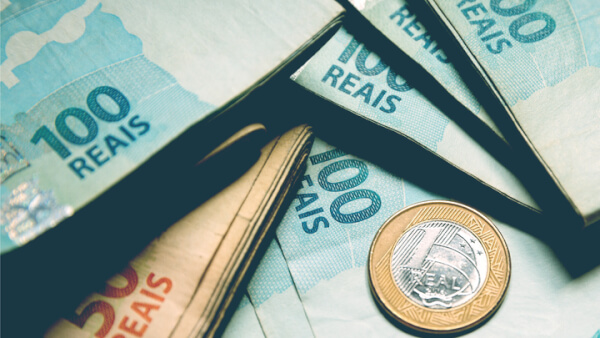How to buy a prepaid SIM card for Brazil?
Check out our in-depth guide on everything you need to know about buying a prepaid Brazil SIM card, including different providers, pricing, and features.

Planning a trip to Brazil from the UK? Whether you’re travelling there for business or pleasure, you’re going to need some spending money.
While credit and debit cards are widely accepted in Brazil, you never know if a small shop or restaurant will be unable to take your plastic. So, you’ll want to make sure you have some Brazilian reais in your wallet.
We’re here to help you get your hands on some cash, with a handy guide to ATMs in Brazil. Read on for info on where to find ATMs, how much they charge and whether there are any limits you need to know about.
We’ll even show you a super convenient way to spend abroad using the Wise card, which works in countries.
So, let’s get started.
There’s a wide network of ATMs in Brazil, so you shouldn’t have too much difficulty finding one.
You can expect to find ATMs in major airports, on main shopping streets and outside banks. They’re everywhere in big cities, but there should be at least one or two in smaller towns and villages too.
However, you might struggle if you’re visiting a remote, rural or island location in Brazil.
To find your nearest ATM in Brazil, you can use these ATM locator tools from major Brazilian banks and networks:
ATMs are generally called caixa eletrônico or extratos in Brazil. The term ‘ATM’ is not so commonly used.
ATMs in Brazil generally accept Visa and Mastercard debit and credit cards. This is good for UK travellers, as these are the most commonly issued types of cards in the UK. Both local and foreign-issued cards should be accepted in most cases.
American Express and Discover cards aren’t widely accepted, so you might struggle to find an ATM you can use if you only have this kind of card.1
So, you should be fine to use your UK-issued card in Brazil. The only thing to check before withdrawing cash is whether your bank at home has any charges for overseas ATM withdrawals.
You can search for your nearest cash machine in Brazil with these global ATM locators:
ATMs in Brazil accept both the 4-digit PINs we use here in the UK, as well as 6 digit PINs.1
When it comes to paying for goods and services in shops and restaurants, you’ll find mainly Chip and PIN systems in place. There’s a small chance you may encounter magnetic stripe systems (where your card needs to be swiped) but it’s unlikely.
The maximum amount you can withdraw from an Brazilian ATM will largely depend on your bank. Each bank usually has its own daily, weekly and/or monthly withdrawal limits.
ATMs in Brazil also tend to have their own withdrawal limits of between R2,000 and R2,500.1
Nowadays, it’s no longer strictly necessary to tell your bank you’ll be using your debit card abroad. But you might want to do it anyway, just in case your overseas transactions are mistakenly flagged up as fraud or your card is blocked.
To avoid any of this hassle, it could even be worth getting an alternative spending card - one that is specially designed for international travel.
A great option is the Wise card, as it works in countries and lets you withdraw up to £200 a month (max. 2 withdrawals) from overseas ATMs without any fees. Wise doesn’t charge for these withdrawals but you’ll need to check that the ATM operator doesn’t charge its own fees.
Choose to withdraw in the local currency and your Wise card will do the currency conversion at the mid-market exchange rate with only a small conversion fee*.
This means no expensive mark-ups eating into your spending money.
Now for the important part - how much it costs to use ATMs to withdraw money in Brazil. Read on for info on currency conversion costs, transaction fees and more.
The first potential cost of using an overseas ATM is related to currency conversion.
If you’ve ever used an ATM in another country, you may be familiar with the screen asking you if you want the transaction to be carried out in British pounds or the local currency. You’ll encounter this in Brazil too.
It’s always recommended to choose to withdraw in the local currency, in this case Brazilian real (BRL) or reais - without a currency conversion. This will mean you get a better rate, as the conversion will be done by your bank or card provider.
However, if you choose to be charged in British pounds, the ATM will make up an exchange rate using something called Dynamic Currency Conversion (DCC). This rate will almost certainly be unfavourable, and can make the transaction expensive for you.
So the bottom line is - it’s always best to press ‘no’ when asked about currency conversion.
Your bank back in the UK may charge fees for using your card abroad. These fees could apply to spending, cash withdrawals or both.
It’s crucial to check this carefully before you travel, either by contacting your bank or reading the terms and conditions for your account. You don’t want to be hit by unexpected charges while you’re away.
Some ATMs in Brazil are free to use, while others can charge fees up to R20 per transaction.2
So, you’ll need to do a little shopping around to find the cheapest (or hopefully free) option.
It may be possible to get free cash withdrawals in Brazil. You can try a few bank’s ATMs, although most are part of the Banco24Horas network which may charge fees.2
Another option is to see if your UK bank has a partnership with any banks in Brazil. If so, you may be able to withdraw cash for free (or for lower fees) at these ATMs.
You can also get a limited number of free ATM withdrawals a month if you have a Brazilian bank account.3
Some ATMs may offer you a ‘service’ of being charged in your local currency (i.e. GBP). While you may feel relieved to see the figures on terms you’re more familiar with, it’s always best to decline this option.
Being charged in the local currency helps you avoid hidden ATM rip-offs by giving you the best possible exchange rate.
Choosing to see the transaction shown in British pounds gives the ATM permission to give you an arbitrary (generally much more unfavourable) exchange rate for your withdrawal. So, it’s best avoided.
Check out the latest GBP - BRL conversion rates below:
ATMs at airports tend to be very expensive, charging high fees for withdrawing money or converting currency. So even though they may be convenient, they’re best avoided unless you have no other option.
If your UK bank has an overseas ATM network or partners with banks in Brazil, you may be able to benefit from low or no fees on ATM withdrawals. It’s always worth finding out before you travel.
Some UK banks don’t charge foreign transaction fees for spending and cash withdrawals. If this isn’t something your bank offers and you travel a lot, it may be worth switching banks so you can benefit from a fee-free card.
Another important thing to remember is that you should avoid making ATM withdrawals with a credit card.
It’s usually a lot more expensive than using a debit card, as fees are charged for cash-based transactions. Plus, interest will likely start accruing right away, so you won’t benefit from your usual interest-free period.
If you travel regularly, the Wise card is the perfect way to spend and withdraw cash worldwide.
It’s a dedicated travel card, letting you spend like a local in countries worldwide. It automatically converts your pounds to the local currency at the mid-market exchange rate whenever you spend.
And when you need cash, you can use it to withdraw up to £200 a month (max. 2 withdrawals) fee-free*. You’ll just need to check whether the ATM operator charges its own fees.
Wise only ever charges a small, transparent fee* for currency conversion, and it’s fee-free if you already have the currency in your Wise account.
Sign up for a Wise account online and you can get your own Wise card for a one-time fee of just .
Cards are widely accepted in Brazil, but cash is still the preferred payment method in some areas and for some vendors.
You’ll be fine with a debit card in the big cities, but you may still want to have some cash on you for things like tipping and shopping at street markets. If you’re visiting a remote, rural or island location, it’s recommended to take some cash with you.
Yes, you should be fine to use your UK debit card in Brazil, as both Visa and Mastercard are widely accepted.
Stick to ATMs provided by major banks, which have services in English as well as Portuguese. You should also look for those in secure, public areas, and if possible find ATMs with the lowest transaction fees.
You’ll find a wide network of ATMs in Rio, including ones which offer services in English. If you’re worried about security, choose an ATM located in or outside a bank branch.
To avoid ATM fees, look for fee-free ATMs, including banks which partner with your home bank in the UK.
You should also choose for the transaction to be carried out in the local currency, without currency conversion.
Sources used:
1. ATM Fee Saver - info on cards, ATMs and pin numbers in Brazil
2. N26 - card ATM fees in Brazil
3. Banco24Horas - free withdrawals scheme in Brazil
Sources last checked on date: 18-Oct-2024
*Please see terms of use and product availability for your region or visit Wise fees and pricing for the most up to date pricing and fee information.
This publication is provided for general information purposes and does not constitute legal, tax or other professional advice from Wise Payments Limited or its subsidiaries and its affiliates, and it is not intended as a substitute for obtaining advice from a financial advisor or any other professional.
We make no representations, warranties or guarantees, whether expressed or implied, that the content in the publication is accurate, complete or up to date.

Check out our in-depth guide on everything you need to know about buying a prepaid Brazil SIM card, including different providers, pricing, and features.

Check out our handy guide to using PayPal in Brazil, including what fees you can expect.

A handy guide on how Revolut works in Brazil, including info for UK customers on using a Revolut card abroad.

Brazil has a lot to offer visitors. Since hosting the Football World Cup in 2014 and the Olympics in 2016, travellers from all over the world have arrived,...